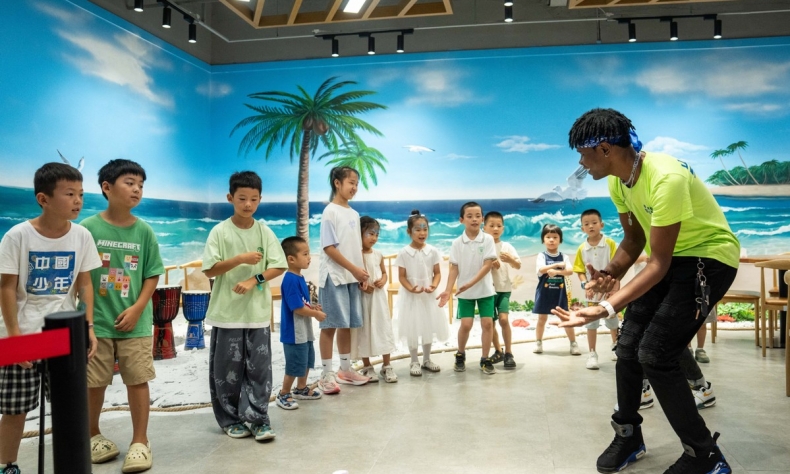Advancing Modernisation Through Exchanges

Civilisational exchanges represent a crucial step towards realising a China-Africa community with a shared future.
In his keynote speech at the opening ceremony of the Beijing Summit of the Forum on China-Africa Cooperation (FOCAC) in September 2024, Chinese President Xi Jinping emphasised that China will enhance people-to-people and cultural exchanges with Africa, champion mutual respect, inclusiveness and coexistence of different civilisations on the way to modernisation, and strive together for more fruitful outcomes under the Global Civilisation Initiative.
Civilisations are enriched through exchange and grow through mutual learning. The exchange between Chinese and African civilisations represents a crucial step towards realising the shared dream of modernisation and building an all-weather China-Africa community with a shared future for the new era.
Both Chinese and African civilisations, with their rich histories and vibrant traditions, have flourished in different ways. Despite the vast geographic distance, the two regions have maintained a long-standing relationship, marked by broad and enduring exchanges across various fields.
Since the 21st century, under the framework of FOCAC, exchanges and mutual learning between Chinese and African civilisations have deepened significantly. This has further strengthened people-to-people bonds, solidified the foundation for the development of China-Africa relations, and set an example for promoting exchanges among human civilisations and building a community with a shared future for humanity.
Principles of equality and inclusiveness
Proper attitudes and principles are essential for promoting exchanges and mutual learning among civilisations. The success of exchanges between Chinese and African civilisations as a global model lies in our consistent adherence to principles of mutual respect, harmonious coexistence, mutual learning, and win-win cooperation.
Our successful exchanges are founded on the belief that civilisations are inherently diverse, and it is precisely this diversity that gives value to mutual learning and exchange. Both sides uphold principles of mutual respect, appreciation, dialogue, and the exchange of ideas, creating a rich tapestry of shared growth and understanding.
China-Africa civilisational exchanges have consistently adhered to the principle that all civilisations are equal. This belief in equality forms the very foundation of meaningful exchange and mutual learning. Whether in ancient interactions through trade or in modern and contemporary contexts, China has never approached Africa with attitudes of superiority or condescension.
China also maintains that values, development paths, and governance models cannot simply be copied or imposed. Instead, they must be adapted to local contexts, respecting the uniqueness of each civilisation.

Fruits of win-win cooperation
Exchange and mutual learning between China and Africa have a long and rich history. As early as the Western Han Dynasty (202 B.C.–A.D. 8), Tang Dynasty (618-907), and Southern Song Dynasty (1127-1279), numerous texts documented Africa’s local customs and geography.
After the founding of the People’s Republic of China in 1949, late Chinese Premier Zhou Enlai visited 10 African countries and proposed five principles for China’s handling of relations between Arab countries and African countries, as well as the eight principles for economic aid and technical assistance to foreign countries. These initiatives laid a solid foundation for the development of China-Africa relations.
With the establishment of FOCAC in 2000, exchange and cooperation between China and Africa stepped into a more structured, planned, and systematic new stage, providing new platforms and mechanisms for exchange and mutual learning. The Conference on Dialogue Between Chinese and African Civilisations serves as an important mechanism that emphasises exchange between civilisations and cultural and people-to-people cooperation. This initiative has yielded significant achievements in exchange and mutual learning.
China-Africa cooperation has evolved through milestones such as the 10 major cooperation plans, the eight major initiatives, and the nine programmes. These efforts have achieved concrete results in enhancing material well-being with a focus on infrastructure and industrial projects. At the same time, significant progress has been made in raising cultural and ethical standards, with deepening cooperation in education, culture, and tourism, and think tank exchanges. Additionally, ecological cooperation centred on environmental protection and sustainable development has thrived.
Initiatives such as the Plan for China-Africa Cooperation on Talent Development and the Future of Africa-Vocational Education Cooperation Plan have facilitated talent development, while the establishment of 61 Confucius Institutes, 48 Confucius Classrooms, and 23 Luban Workshops has expanded educational collaboration.
Meanwhile, grassroots initiatives, including the China-Africa People’s Forums, China-Africa People-to-People Friendship Action, and the Silk Road Community Building Initiative, have deepened ties among civil organisations, youth, and women.
Through these multifaceted efforts, China and Africa continue to strengthen their partnership, promoting sustainable development, fostering cultural exchange, and advancing shared modernisation goals.
Building the future
On 15 March 2023, President Xi proposed the Global Civilisation Initiative, advocating respect for cultural diversity, shared human values, cultural inheritance, innovation, and enhanced international exchanges. At the 2024 FOCAC Beijing Summit, the Partnership Action for Mutual Learning Among Civilisations was launched, focusing on governance exchanges and modernisation cooperation and aiming to build a platform for sharing governance experience.
The practice of China-Africa exchanges will yield political, economic, and cultural benefits. It will contribute to fostering a peaceful and secure international environment, an open and inclusive economic cooperation framework, and a revitalised environment for civilisational inheritance and innovation. These efforts will inject new momentum into the cause of jointly advancing modernisation for China and Africa.
Zhou Qian, Professor, Institute of African Studies, Zhejiang Normal University;
Hu Lanyin, Master’s Student in African Studies, Zhejiang Normal University.
 Facebook
Facebook
 Twitter
Twitter
 Linkedin
Linkedin
 Google +
Google +










